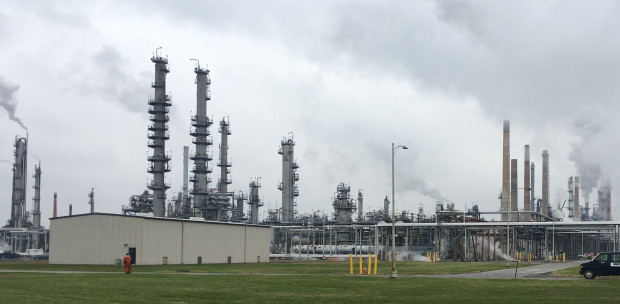Philadelphia area refineries urge EPA to reform biofuels credit program

Jon Hurdle / StateImpact PA
Delaware City Refinery, where the cost of buying the EPA’s biofuel credits now exceeds payroll, and is the second-largest expenditure item after crude oil.
Workers and managers from three Philadelphia-area refineries on Monday urged federal regulators to reform a renewable fuels program that is costing the companies millions of dollars and threatening jobs.
Several hundred workers and contractors rallied at Delaware City Refinery to protest the high cost of so-called RINs – credits that refineries like the Delaware facility are required to buy under the U.S. Environmental Protection Agency’s Renewable Fuel Standard (RFS), a 2005 regulation designed to boost the use of biofuels, primarily ethanol, instead of petroleum.
The Delaware refinery is cooperating with Philadelphia Energy Solutions in South Philadelphia and the Monroe Energy refinery in Marcus Hook in seeking relief from the EPA after a recent rise in the cost of the credits which are traded by financial speculators and energy companies that are trying to anticipate EPA policy.
The three companies are so-called merchant refiners that have little or no capacity for blending ethanol with petroleum, and so are obligated to purchase the RINs.
The credits’ price has swung widely in recent years amid speculation that the EPA would reduce the “obligation” – or total amount of ethanol required to be used – and then that the agency would not do so, said Michael Karlovich, PBF’s vice president of corporate communications. He said EPA policy is subject to pressure from Washington politicians representing ethanol-producing areas.
Between the third quarter of 2012 and mid-2013, the price of RINs jumped from about 5 cents to $1.45, the highest since the credits were introduced, amid speculation that the EPA was preparing to increase the ethanol obligation, thereby increasing the demand for RINs, Karlovich said.
The volatility followed the first four years of RIN trading, when the price was relatively stable at between 1 and 5 cents, he said.
Later speculation that the EPA was preparing to fix the problem drove down the price to 35 cents in the first quarter of 2017, only to see it rebound to the current 88 cents amid pressure on the Trump administration from the Congressional delegation for Iowa, for a higher ethanol requirement.
Amid the sharp fluctuations, the cost of RINs for PBF now exceeds payroll, and is second only to crude oil and other raw materials, Karlovich said.
Possible EPA policy changes that could provide relief for refiners like PBF include reducing the ethanol obligation, or shifting the obligation so that blenders, not refiners and importers, are required to buy the RINs, Karlovich said.
The EPA did not immediately respond to a request for comment.
The rising market price of the credits cost the Delaware refinery’s owner, PBF Energy, $350 million last year, or about 66 percent of the capital budget, said Brendan Williams, PBF’s director of government relations. He argued that the company may be forced to cut jobs if the EPA can’t find a way of reducing the financial burden.
“Government needs to do something to get a handle on the uncontrollable cost of credits needed to comply with the Renewable Fuel Standard,” Williams said. “Right now, the nation’s biofuel mandate requires refiners to get credits to show biofuels in the fuel supply even if you don’t have the capabilities to blend it. It’s really putting refining jobs at risk.”
At Philadelphia Energy Solutions, RINs cost the company $10 million in 2012, and forced the company to lay off 70 workers in 2016, said spokeswoman Cherice Corley.
RINs, or Renewable Identification Numbers, are issued for each gallon of ethanol sold, as a way for the government to track whether the required amount of the fuel meets the requirements of the RFS and the Energy Independence and Security Act of 2007, which started the RINs system.
Delaware Governor John Carney said the RFS began with a worthy goal of reducing fossil fuel use, but the credits have become a significant financial burden for the three refineries.
“It’s got out of whack so it’s costing these merchant refineries tens of millions of dollars – billions of dollars if you add it up – over an extended period of time, and really compromising the viability of the facilities,” Carney said after the rally. “These jobs are just too important to us, to the families, to the communities, to our state, for something like that to take place.”
Kevin Herbein, president of Local 4898 of the United Steel Workers at the Delaware plant, noted that it was shut by its previous owner, Valero, in 2009 and then reopened the following year by PBF but is now threatened by the financial burden of the RFS policy.
“Here we are eight years later, dealing with the unintended consequences of misguided federal policies that are threatening the existence of the refinery,” Herbein said.
















